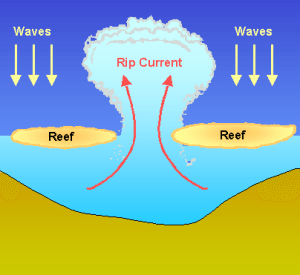Last Updated on July 10, 2024 by Snorkel Ken

Living near the ocean is a beautiful thing. Visiting island paradises during vacation is the treat of a lifetime. All of that beach and ocean time comes with its own set of risks, though. Between dangerous ocean conditions, not so friendly marine life, tides, currents, weather and contaminated water, your time in paradise may have a pricey paradox.
There are times when trips to the beach to do some snorkeling aren’t always the “fun in the sun” that it was planned to be. Don’t be scared of the beach, but respect it. Never turn your back on the ocean or look to closely at things that don’t seem familiar or you’re unsure of. And…
Keep Alert of the Following 8 Ocean Dangers
 Rip Currents
Rip Currents
Rip currents are strong, flowing ocean currents that pull away from shore and out to the open ocean. They usually begin at the shoreline, through the flowing waves, and right past the break… Never fight a rip current if you’re stuck in one and don’t panic. Swim parallel to shore until you’re out of the current and then head back in. If you’re in trouble, wave your hands. Always swim at beaches with lifeguards. For added safety wear a snorkel vest!
Shorebreak
Shorebreaks can be violent and often occur when there is a quick transition from deep to shallow waters. The water breaks violently on the shallow waters and shore causing you to tumble and be thrown. This type of ocean danger can break bones and necks. Beware of warning signs and if you’re unsure about anything (or if no signs are posted) ask a lifeguard about conditions.
Lightning

Lightning kills, on average, about 35 to 40 people in the United States each year. Don’t go to the beach on days when there is thunder and lightning. If a thunder storm happens while you’re at the beach then seek shelter and don’t go back until 20 to 30 minutes after the thunder has stopped completely. For the safest locations, find a residential building or automobile. Stay away from rain shelters and open top vehicles.
Tsunamis
Tsunamis happen and they can’t be predicted because they are the destructive aftermath of other occurrences, mainly earthquakes, in coastal areas. While not all tsunamis are caused by earthquakes (the other causes include meteor impacts, landslides, and ocean floor slumps) they can be very deadly no matter how they form. You can read more about tsunami preparedness here.
 Sharks
Sharks
Shark attacks are rare but when they do happen they usually occur close to shore between sandbars after sharks have been trapped by a low tide. Not always, though. Sharks are wild marine animals and unpredictable. Stay close to shore, don’t go into the water with open wounds, don’t wear jewelry or flashy color (sharks see contrast and “bling” really well), and stay away from the water when sharks are most active which are nighttime and twilight.
Jellyfish
Jelly fish sting. It hurts. It can be deadly. And they’re hard to see. The good news is that of the 2,000 plus species of jellyfish, only 70 of them really do any major damage. Keep away from them in the water and on the shore as even washed up jellyfish tentacles can sting. Lifeguards can help out with first aid for jellyfish stings.
Sunburn and Heat
The beach can start great but all of that heat an sun can catch up to you. There is always the possibility of heat cramps, heat exhaustion, and heat stroke (deadly) with too much fun in the sun. Don’t forget about sunburn, either. When a burn is severe and is accompanied by a headache, chills, or a fever you should seek medical help right away. Be sure to protect your skin from the sun while it heals. SUNSCREEN, SUNSCREEN, SUNSCREEN. Stay hydrated. Stay hydrated. Stay hydrated.
Water Quality
Depending on where you are in the world, the water and ocean quality of that area may not even be suitable for swimming or even touching the ocean water. When land and fresh water drain into the ocean it is sometimes contaminated with sewage. Other ocean quality hazards include sunken boats and chemicals, animals, pets, fertilizers, septic, and oils/hazardous substance spills. High levels of bacteria and other chemicals in the water can cause gastrointestinal illnesses in those that swim directly in the water. When visiting the beach, be aware of all beach closures and advisories.
That’s it. Stay safe and Happy snorkeling. If you haven’t already done so, please sign up for our newsletter (located at the bottom of the website “Join our Newsletter) or like the Facebook page so that you can stay up to date on all of our new reviews and articles.









